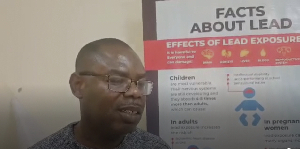
The ongoing use of lead-based paints in Ghana has drawn criticism from the Environmental Protection Agency (EPA), which highlights the serious health dangers these paints represent, particularly to pregnant women and children.
As part of the EPA's 50th Anniversary Celebration, the issues were brought up at a stakeholder conference at Tema.
The purpose of the seminar was to raise awareness of the dangers of lead exposure and to promote the use of safer substitutes in the production of paint.
The Deputy Director of the Chemical and Quality Unit of the EPA, Mr. Lovelace Sarpong, noted that lead-based paints, formerly popular for their brilliant colours and durability, are now known as a major source of lead poisoning.
Mr. Sarpong emphasized that in order to stop their use and switch to non-toxic alternatives, everyone must work together. Even while lead paint on walls might appear innocuous, as the paint ages, lead-laden dust and particles are released into the air, posing serious health concerns to families.
According to him, children who consume or breathe in this dust are more vulnerable to cognitive and developmental problems.
He went on to discuss the many negative health effects of lead exposure, such as anemia, kidney damage, and behavioural problems. He explained that pregnant women run the risk of exposing their unborn children to lead toxins, which could cause developmental delays and other problems, while children are particularly at risk because of their developing nervous systems.
Because lead poisoning does not show symptoms right away, it is a quiet hazard. But over time, it may show up as irreparable harm to the brain and other organs. He underlined that getting rid of paints that contain lead is essential to protecting the public's health.
The availability of safer, non-toxic substitutes for lead-based paints was also emphasized at the conference, and producers and authorities were urged to give them top priority in terms of production and implementation.
Ghana must not fall behind other nations in the global phase-out of lead-based paints. In comparison to the long-term health and environmental effects of lead poisoning, the expense of safer substitutes is negligible, Mr. Sarpong stated.
Eliminating lead-based paints, he continued, was a shared duty, stating that "consumers must make educated decisions, manufacturers must innovate, and regulators must enforce." We can all live in a safer environment if we work together.
In the meanwhile, the EPA has urged customers to seek safer products and urged regulatory agencies to enforce current laws on lead concentration in paints more strictly.
In order to educate the public on the risks associated with lead-based paints and how to recognize and select lead-free alternatives, the agency also supported educational initiatives.
The seminar's attendees, who included local government representatives and medical professionals, promised to back the EPA's initiatives to promote safer substitutes and guarantee standard compliance.